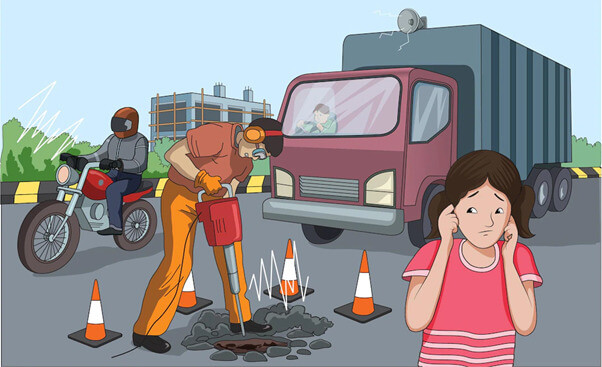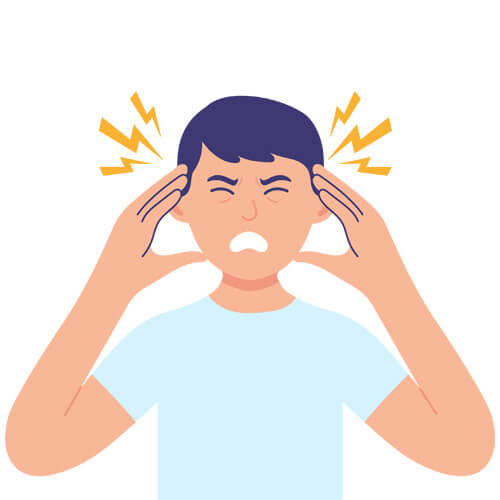Impact of Noise Pollution
The term “noise pollution” refers to the frequent exposure to loud noises that have the potential to harm people or other living things. The World Health Organization states that no matter how long or consistently exposed, living things are safe when sound levels are lower than 70 dB. Extended exposure to noise levels of more than 85 dB may be dangerous. Let’s look more at Essay on Noise Pollution.
How has Noise Pollution Changed our Daily Lives?

This pollution is so pervasive in today’s society that we frequently no longer even perceive it. The human mind and system have become so immune to the noise in the surroundings that people realize the adversities when it is too late. Every appliance that is present and operated around us produces noise, such as the ticking clock, the washing machine, the dishwasher, the television, the smartphone in your hand, the toaster in your kitchen, the electric kettle on the stove, everything.
However, all of these don’t account for noise pollution. The honking vehicles, the airplanes, the construction work hassle, and unnecessary loud music, which often come out as irritating, are the root causes of our issue. Even though the human mind can find some solace in these noises, the underlying issues are not worth compromising. The ‘immunity to noise’ has started deteriorating the well-being of people, highlighting the importance of finding solutions like the best earbuds for small ears to mitigate these effects.
People exposed to loud or high-frequency noises often appear irritated, lost, anxious, and angry. But humans aren’t the only beings affected. Our precious wildlife, sensitive to high-frequency noise, is at the brim of losing their lives. In the following section, let’s examine how noise affects the other lives around us.
What are the Adverse Side Effects of Noise Pollution?
There are many ways that noise pollution can be harmful to human health. In this article, Essay on Noise Pollution, we will discuss some of the side effects.
#1 Hypertension
In this instance, hypertension directly results from noise pollution raising blood pressure for longer. Noise pollution can now cause hearing loss, whether listening to loud music through headphones, working around loud drilling noises, or experiencing different events where the noise level reaches unsafe levels, such as 120 dB for children and 140 dB for adults.
#2 Damaging the sleep schedule
Sleep disruptions are a significant condition that can impair daily functioning and result in serious illnesses. Night-time air or land traffic typically brings them on. Children seem susceptible to noise pollution, and several diseases and dysfunctions linked to noise pollution are known to harm children, including hearing loss and other physical and psychological problems.
#3 Poor hearing ability
Youngsters who frequently listen to music players at loud volumes risk developing hearing problems. According to estimates from 2001, 12.5% of American children aged 6 to 19 experienced hearing loss in either one or both ears.
#4 Heart Problem
Cardiovascular disorders can result from elevated blood pressure brought on by noise pollution, especially at night. Noise pollution doesn’t always cause dementia but might accelerate or worsen the condition’s onset. In reality, “noise irritation” is widely used to describe an emotional response that might have an instantaneous effect.
#5 Damage to marine and terrestrial wildlife
Oceans today are no longer silent. Thousands of oil drilling platforms, sonars, seismic survey equipment, coastal recreational watercraft, and shipping vessels currently populate our waterways, which is a significant source of noise pollution for marine life.
It mainly impacts the whales; their hearing utilizes for navigation, finding food, and communication. Thus, noise pollution affects the eating behaviors, reproductive cycles, and migration routes of cetaceans (whales and dolphins), which can result in hemorrhaging and even death. Noise pollution from firecrackers, vehicles and other sources impacts sea life and land animals. Increased aviation traffic has a particularly negative impact on birds.
#6 Poor Performance in Daily-Life
Following World Health Organization (WHO), one in three persons in Europe is adversely affected by traffic noise. There are considerable social and economic repercussions of noise pollution beyond the strictly physiological effects on the individual.
Noise pollution impairs sleep, which lowers daytime productivity, causes hypertension and cardiovascular disease, adds to the burden on the health system in terms of time and money, and has a detrimental impact on children’s academic performance.
Conclusion
We should follow some guidelines to reduce noise pollution. Whenever we surround by loud noises, we should use earplugs. Keep the volume at about 35 dB in your bedroom at night and about 40 dB during the day. Choose a residential neighborhood as far away from busy roads as you can. Avoid using headphones for long periods, especially when the volume is loud. Avoid jobs that require regular exposure to loud noise. Therefore we have come up with an Essay on Noise Pollution for students, which will help them understand their causes.
Recommended Articles
We hope that this EDUCBA information on “Essay on Noise Pollution” was beneficial to you. You can view EDUCBA’s recommended articles for more information,

